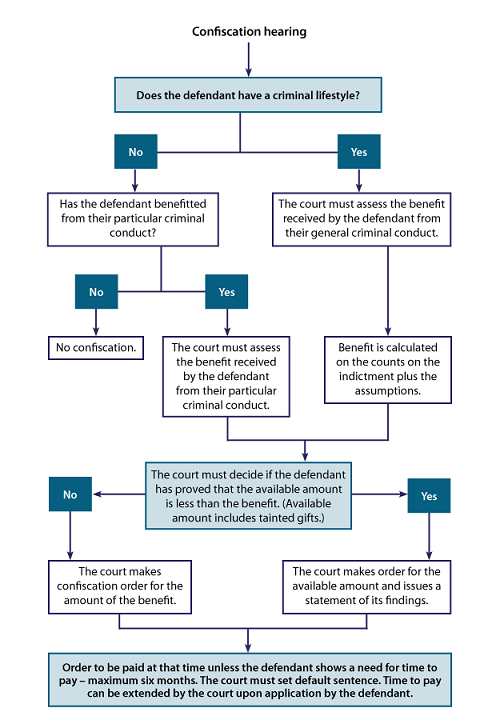This article describes how a confiscation order under the Proceeds of Crime Act 2002 might effect a third party. We are looking at a confiscation order made in the Crown Court. This will be under the Proceeds of Crime Act 2002. The confiscation order will apply to you in some cases, even if you have not been part of the criminal proceedings.
What is a confiscation order?
A confiscation order is an order which requires a convicted defendant to pay a sum of money. It does not just apply to money laundering offences. It will take effect wherever the criteria will apply. The prosecutor applies for the confiscation order as part of the sentencing process.
The benefit figure
The Crown Court will determine the benefit figure derived from criminal conduct . The value of the property or financial advantage is calculated to arrive at the benefit figure. A consideration of other assets which is not related to the offence also takes place at the confiscation hearing.
The available amount
The Crown Court will also make a determination in relation to the available amount. The court will calculate this by working out the the defendant’s realisable assets . This will however exclude any payments that take priority over a confiscation order. It will also exclude any tainted gifts made by the defendant. The defendant has to pay this unless some or all of the amount is no longer available. The Crown Court will also order a period of imprisonment in default of none payment. The the amount owing will determine the length of the sentence.
How does the confiscation order effect me?
S10A of the Proceeds of Crime Act 2002 allows the Crown Court to make a determination on third party rights. There are consequences to you if you become added to the court case of another.
- You can receive a clear determination on any disputed property. This might be a house, a car, jewellery or the contents of a bank account.
- You can have legal representation and make submissions on your rights at the confiscation hearing.
Confiscation order powers under S.10A
The court considers the rights of a third party. This is in relation to any realisable assets which might be used to satisfy the confiscation order. S.10A allows a Judge to make this determination. The court can determine the extent of a defendant and third parties’ interest in the asset if it gives the third party a ‘reasonable opportunity’ to make representations.
A reasonable opportunity will include the opportunity to be represented at the hearing and make oral and written representations to the court
The use of s.10A is within the courts discretion. It should be used only where ‘it thinks it appropriate to do so’.
If the court does proceed under s.10A, sub-section (3) states that the ruling it makes in relation to the confiscation order is conclusive in relation to the determination of the defendant’s interest for the purposes of issues that arise in connection with the realisation of the property or the transfer or an interest in that property.
Courts power to order a statement
The Court also has the power under s.18A to require a person who it thinks might have an interest in the defendant’s property to give information. This is to help it make a determination under s.10A. Any failure to do so will allow the court to draw an adverse inference against the third party when making the confiscation order.
Furthermore if you do not comply with the order, you could face contempt of court proceedings.
How to react to a notice to serve a statement:
The rights of a third party remain something to worry about. Although you have an opportunity at an early point to fight for your rights, it is not straightforward. The court will primarily be focused on what is available for the confiscation order.
- Properly prepare.
- Be thorough.
- Clearly state what interest you as a third party are requiring.
- Do not rely on the representations of the defendant to help you in your case. They will have their own interests at heart which will probably be in conflict to your interests. Remember that they will be seeking to minimise the order against themselves and this might be to the detriment of your interests
Rose & Dunn are specialist criminal defence and motoring law solicitors and higher courts advocates. We can be contacted at any time of day or night. If you need emergency police station assistance contact us using any of the methods below and we will get back to you as soon as possible.
- Email:info@rosedunn.co.uk
- Telephone: 01928 572030 or 01925 419365
-
WhatsApp and text text : 07801758664 (office)
-
WhatsApp and text : 07739324381 ( 24/7 )
By WhatsApp only :
-
Messenger
-
Facebook
-
Twitter
-
Instragram
- Fax: 0870 4954998

